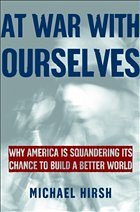Key Features:
Since September 11th America policies have become more and more of topic for discussion in non-US households
- Michael Hirsh - a correspondent for Newsweek draws on his experiences to provide an original explanation of America's role
- Demonstrates why America can't go alone
- A most revealing book from an insider - a must for anyone who is following current affairs
Description:
Using colorful vignettes and up-close reporting from his coverage of the first two post-Cold War presidents, Bill Clinton and George W. Bush, Hirsh argues that America has a new role, never before played by any nation: it is the world's Uberpower, overseeing the global system from the air, land, sea and, increasingly, from space as well. And that means America has a unique opportunity to do what no great power in history has ever done-to perpetuate indefinitely the global system it has built, to create an international community with American power at its center that is so secure it may never be challenged. Yet Americans are squandering this chance by failing to realize what is at stake. At the same time that America as a nation possesses powers it barely comprehends, Americans as individuals have vulnerabilities they never before imagined. They desperately need the international community on their side.
In an era when democracy and free markets have become the prevailing ideology, Hirsh argues, one of America's biggest problems will be "ideological blowback"-facing up to the flaws and contradictions of its own ideals. Hence, for example, the biggest threat to political stability is not totalitarianism, but the tricky task of instituting democracy in the Arab world without giving Islamic fundamentalists the reigns of power. The only way for Washington to avoid accusations of hypocrisy is to allow the global institutions it has built, like the U.N., to do the hard work of promoting U.S. values.
Since September 11th America policies have become more and more of topic for discussion in non-US households
- Michael Hirsh - a correspondent for Newsweek draws on his experiences to provide an original explanation of America's role
- Demonstrates why America can't go alone
- A most revealing book from an insider - a must for anyone who is following current affairs
Description:
Using colorful vignettes and up-close reporting from his coverage of the first two post-Cold War presidents, Bill Clinton and George W. Bush, Hirsh argues that America has a new role, never before played by any nation: it is the world's Uberpower, overseeing the global system from the air, land, sea and, increasingly, from space as well. And that means America has a unique opportunity to do what no great power in history has ever done-to perpetuate indefinitely the global system it has built, to create an international community with American power at its center that is so secure it may never be challenged. Yet Americans are squandering this chance by failing to realize what is at stake. At the same time that America as a nation possesses powers it barely comprehends, Americans as individuals have vulnerabilities they never before imagined. They desperately need the international community on their side.
In an era when democracy and free markets have become the prevailing ideology, Hirsh argues, one of America's biggest problems will be "ideological blowback"-facing up to the flaws and contradictions of its own ideals. Hence, for example, the biggest threat to political stability is not totalitarianism, but the tricky task of instituting democracy in the Arab world without giving Islamic fundamentalists the reigns of power. The only way for Washington to avoid accusations of hypocrisy is to allow the global institutions it has built, like the U.N., to do the hard work of promoting U.S. values.

